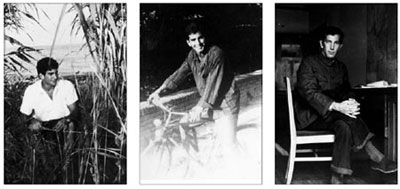Sauro Angelini might have enjoyed an easier and more comfortable life after retirement if his wife hadn't suggested opening a restaurant in Beijing.
The Italian at first disapproved of the idea for fear he would become "trapped" in the job. But since Meeting Point opened in May, its president seems to love the eatery more than anyone else.
Instead of burying himself in his accounting books to stretch every buck, the 65-year-old spends most of his time chatting with customers, making full use of his conventionally Italian charm and enthusiasm.
Sauro Angelini, as seen in the late 1970s, when he worked as a polisher for China Pictorial.
There are hardly any language barriers between the multilingual restaurateur and his customers, and he freely chats with diners about current events or his 30 years of living in the Chinese capital.
"The restaurant is like a meeting room for me," Angelini says, stylishly clad in a white, round-neck sweater and holding a glass of red wine.
"People come here not just to eat but also to socialize, which is good for me, as the more information you get, the more open you are," he adds.
Angelini came to Beijing in 1976, because the communist then thought China could provide a new model for his sociological studies. And he was interested in seeing how the country was developing.
But he found that the realities of China were different from what he had seen in European media. When Angelini first saw the city, it seemed more like a big village in shades of gray.
Back then, the polisher of China Pictorial, along with other foreign experts, was accommodated in the Friendship Hotel, which was located in the city's outskirts and surrounded by farmhouses.
There were no imported cigarettes or coffee available in the market. So, he had to ask people planning to visit China to bring him these luxuries, which he would then share with his foreign friends.
In addition, Angelini was mostly starved of the opportunity to sample the delights of Chinese cuisine. The only vegetables he could get regularly were cabbage and potatoes, especially during wintertime.
"I ate a lot of cabbage during that period. One day, I looked at myself in a mirror and was surprised to see that I myself appeared much like a leaf of cabbage," he recalls, laughing.
But he says he has never seen the point in complaining, because his living standard was still so much higher than most Chinese people.
Angelini had the privilege of attending parties and formal dinners with Chinese leaders, such as Hua Guofeng and Deng Xiaoping, on a number of occasions. But he didn't believe he deserved these invitations, because he was just an ordinary foreign worker.
In his spare time, the father of three enjoyed traveling in the countryside, where he could learn more about China.
However, the villagers in remote areas often regarded his presence like that of a Martian.
Everywhere he went, curious crowds followed him - even to the toilets, which he says embarrassed him the most.
In the late of 1970s, he became a representative of the Italian Commimpex Company's Beijing office during China's opening up. In 1985, he established his own company, Sagec Asia, which imported machinery from Europe to China until 2005.
Angelini is sanguine about the face-lift given to Beijing's downtown over the past two decades.
"People might argue that old buildings should be well-persevered in the way we do in Italy. But the point is, Italian houses have good facilities - individual kitchens and private toilets - even though they were built long time ago, while traditional quadrangular dwellings here didn't. And some had even lost their original structures because of the overcrowding of residents," he says. "The government has no choice but to demolish them and build new ones to give people more space."
Angelini says the biggest changes he has seen in China have less to do with cityscapes than mentality.
"Society is improving, and people's interests are changing. More and more people have become open-minded and speak freely. If I chat with a young Chinese person, asking about his habits or concerns, his answers might be no different from an Italian's," he explains.
But he is disappointed to discover that today, some Chinese, whose hearts are polluted by material desires, have lost their credibility.
"In the past, people's words were much better than a contract, but it is no longer the case today," he says, with a sigh.
However, according to his Chinese wife Sun Xiaoju, this hasn't turned him sour towards the country.
"Believe or not, he loves China more than some Chinese people do," Sun says. "For instance, he speaks in defense of China in conversations with his friends in Italy during his vacations."
Angelini also refutes the idea, prevalent in the Western world, that China has taken advantage of cheap labor to become an economic success story.
"You can find cheap labor everywhere in the world, but China has something different in this regard," he says.
He offers the Beijing Hotel as an example. It was perhaps the tallest building in the city three decades ago, while today, a multitude of high-rises crowd the same cityscape. Migrant workers built most of these buildings.
"They are intelligent and fast learners; more importantly, they are hardworking. You cannot get this kind of people everywhere in the world. I believe they are the force of China," he says.
Angelini's love of reading has earned him the nickname "Encyclopedia". He and Sun sometimes play a game in which she randomly selects a city on a map and Angelini lists facts about its history, culture and economy.
"Intensive reading makes me understand the cultural and historical differences among China and other countries. The more you understand it, the more you respect it," he says.
Angelini says he certainly has no plans to again live in Italy.
"Having lived in China for three decades, I have more friends here than in Italy. I regard Beijing as my city."
(China Daily November 28, 2007)



